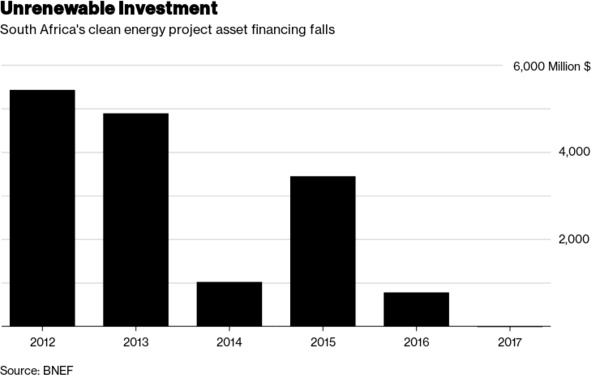News Release from windfair.net
Wind Industry Profile of
A Quiet Exit From Renewable Energies
Just a few years ago, South Africa was role model for an entire continent. Being the only African country among the G20's industrial powers they made great economic progress, including a renewable energy support programme launched in 2011. Since then, a lot of money has flowed into the country from foreign investors: almost 15 billion dollars have since gone into the development of renewable energies and, above all, wind and solar energy have been regarded as the country's great source of hope.
 However, although South Africa's renewable energy market was one of the fastest growing in the world, it has calmed down over the past three years. This is not least due to Brian Molefe, who was appointed Chief Executive Officer of state-owned energy supplier Eskom in 2015. Suddenly there were no more contracts for renewable energy projects, allegedly because they were too expensive. Instead, President Jacob Zuma put Eskom in charge of an expensive nuclear programme.
However, although South Africa's renewable energy market was one of the fastest growing in the world, it has calmed down over the past three years. This is not least due to Brian Molefe, who was appointed Chief Executive Officer of state-owned energy supplier Eskom in 2015. Suddenly there were no more contracts for renewable energy projects, allegedly because they were too expensive. Instead, President Jacob Zuma put Eskom in charge of an expensive nuclear programme.
According to Bloomberg, investments in renewables fell to four million dollars last year. Many of the foreign investors have now looked elsewhere. Other countries in Africa have adapted their support programmes and South Africa is threatening to fall behind.

“Eskom and the South African government have done potentially unrepairable damage to one of the most effective renewables auction programs in the world,” said Victoria Cuming, head of policy analysis in Europe, the Middle East and Africa at Bloomberg New Energy Finance. “Even if the government proceeds with the auction scheme, political and policy risk will be much higher, increasing project costs and making it harder to secure financing.”
Molefe who was considered as close to the president was dismissed last year, but this step could have been too late. So far, the Ministry of Energy has announced plans to relaunch renewable energy development programmes, “once the decision is made.” Not a good basis for attracting investors, especially since many jobs have already been lost in the meantime. “When we have ‘stop-start’ strategies it kills the local supply chain,” says Jasandra Nyker, CEO of developer BioTherm Energy.
 The situation is similar in Pakistan. A few years ago, efforts were made to promote the share of renewable energies. The Gharo-Jhimpir wind corridor, which alone has an estimated potential of 43,000 MW, runs right across the country. Nevertheless, the country's energy mix remains unbalanced: less than 1 percent of its electricity comes from renewable sources. So far Pakistan has had a share of 640 and 400 MW respectively in wind and solar energy. Most of the energy continues to be imported, as Raashid Wali Janjua explains in the Daily Times making the country dependent on fluctuating raw material prices on the world market.
The situation is similar in Pakistan. A few years ago, efforts were made to promote the share of renewable energies. The Gharo-Jhimpir wind corridor, which alone has an estimated potential of 43,000 MW, runs right across the country. Nevertheless, the country's energy mix remains unbalanced: less than 1 percent of its electricity comes from renewable sources. So far Pakistan has had a share of 640 and 400 MW respectively in wind and solar energy. Most of the energy continues to be imported, as Raashid Wali Janjua explains in the Daily Times making the country dependent on fluctuating raw material prices on the world market.
There is also a backlash in politics. At a time when the government should offer attractive conditions to investors interested in solar and wind projects, it does exactly the opposite. Instead of finally expanding the power grid to minimise transmission losses and electricity theft, the existing grid has been burdened by inefficient, obsolete power plants clogging up the transmission lines.
One example is the unused capacity of the 50 MW wind farm in Jhimpir and Gharo. Due to technological constraints, only 30 MW of the installed capacity can actually be generated. The remaining 20 MW remain unused.
Not only the local population suffers from this, but also the rest of the world. Scientists at the Mercator Research Institute on Global Commons and Climate Change (MCC) recently published a study pointing out the grievances of coal use. While countries such as India and China are massively reducing their use of coal for climate protection reasons, the effect of increasing its use in other countries is fizzling out. These include Turkey, Indonesia and - Pakistan, which have increased their expansion plans by 100 percent.
 "Despite all the progress made in renewable energies, the coal problem will by no means be solved by itself. If the international community wants to achieve their targets for reducing greenhouse gas emissions in order to avoid the greatest climate risks, they must act decisively," warns MCC Director Ottmar Edenhofer. "What we need is an exit from coal, worldwide. From an economic point of view, the best way to achieve this is substantial pricing of CO2, which can vary from one country to another, but a coalition of pioneers would have to start - this decade."
"Despite all the progress made in renewable energies, the coal problem will by no means be solved by itself. If the international community wants to achieve their targets for reducing greenhouse gas emissions in order to avoid the greatest climate risks, they must act decisively," warns MCC Director Ottmar Edenhofer. "What we need is an exit from coal, worldwide. From an economic point of view, the best way to achieve this is substantial pricing of CO2, which can vary from one country to another, but a coalition of pioneers would have to start - this decade."
Only if all countries in the world actively counteract this trend it will be possible to achieve the climate targets agreed upon in the Paris Climate Agreement. Climate protection targets that have also been signed by South Africa and Pakistan.
- Author:
- Katrin Radtke
- Email:
- press@windfair.net
- Keywords:
- Pakistan, South Africa, climate change, renewable energy, politics, Paris Climate Agreement, coal







